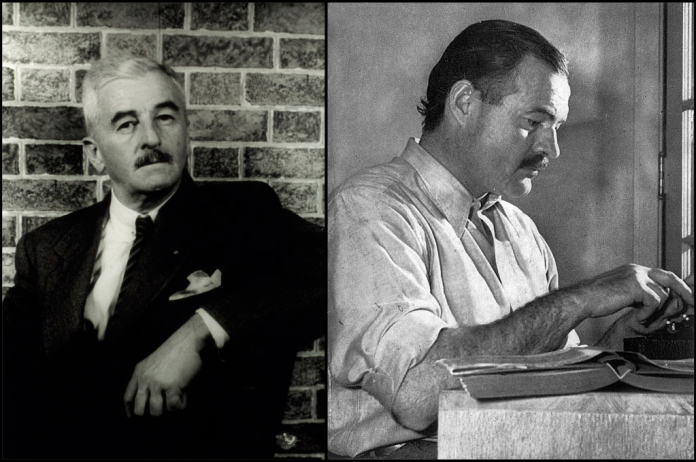Images via Wikimedia Commons
Within the mid-Twentieth century, the 2 giant canine within the American literary scene had been William Faulkner and Ernest Hemingway. Each had been internationally respected, each had been masters of the novel and the quick story, and each gained Nobel Prizes.
Born in Mississippi, Faulkner wrote allegorical histories of the South in a method this is each elliptical and challenging. His works had been marked by means of makes use of of stream-of-consciousness and shifting issues of view. He additionally preferred titanically lengthy sentences, hanging the file for having, according to the Guinness Ebook of Information, the longest sentence in literature. Open your reproduction of Absalom! Absalom! to chapter 6 and also you’ll to find it. Hemingapproach, at the other hand, well-knownly sandblasted the florid prose of Victorian-era books into quick, terse, deceptively simple sentences. His stories had been about rootmuch less, damelderly, cosmopolitan people in exotic locations like Paris or the Serengeti.
When you kind in “Faulkner and Hemingapproach” to your favourite seek engine, you’ll likely stumble upon this well-known alternate — Faulkner on Hemingapproach: “He has never been identified to make use of a phrase that would possibly ship a learner to the dictionary.” Hemingapproach: “Deficient Faulkner. Does he actually assume giant emotions come from giant phrases?” Zing! Faulkner documentedly didn’t imply for the road to come back off as an insult however Hemingapproach took it as one. The incident finished up being probably the most acrimonious within the two authors’ complicated relationsend.
Whilst Faulkner and Hemingapproach never formally met, they had been regular correspondents, and every was once preparedly acutely aware of the different’s talents. They usually had been compuppyitive with every other, especially Hemingapproach who was once a lot more inseremedy than it’s possible you’ll surmise from his macho consistent withsona. Whilst Hemingapproach regularly known as Faulkner “the most efficient folks all,” marveling at his natural abilities, he additionally hammered Faulkner for hoteling to tips. As he wrote to Harvey Breit, the famed critic for The New York Occasions, “If it’s a must to write the longest sentence on the earth to provide a guide distinction, the following factor you will have to rent Bill Veek [sic] and use midgets.”
Faulkner, on his finish, was once no much less compuppyitive. He as soon as informed the New York Herald Tribune, “I feel he’s the most efficient we’ve were given.” At the other hand, he bristled when an editor malestioned getting Hemingsolution to write the preface for The Transportable Faulkner in 1946. “It sort of feels to me in unhealthy style to invite him to put in writing a preface to my stuff. It’s like asking one race horse within the middle of a race to vastforged a blurb on another horse in the similar running box.”
When Breit requested Faulkner to put in writing a evaluate of Hemingway’s 1952 novell. a. The Old Man and the Sea, he refused. But when a couple months later he were given the similar request from Washington and Lee College’s literary journal, Shenandoah, Faulkner relented, giving guarded reward to the novel in a one-paragraph-long evaluate. You’ll be able to learn it beneath.
His best possible. Time would possibly display it to be the most efficient single piece of any folks, I imply his and my contemporaries. This time, he discovered God, a Creator. Till now, his women and men had made themselves, formed themselves out of their very own clay; their victories and defeats had been by the hands of every other, simply to end up to themselves or one another how tricky they may well be. However this time, he wrote about pity: about somefactor somethe place that made all of them: the outdated guy who needed to catch the fish after which lose it, the fish that needed to be stuck after which misplaced, the sharks which needed to rob the outdated guy of his fish; made all of them and liked all of them and pitied all of them. It’s all proper. Reward God that whatever made and loves and pities Hemingapproach and me saved him from contacting it any further.
And you’ll be able to additionally watch beneath a fascinating communicate by means of scholar Joseph Fruscione about how Faulkner and Hemingapproach compuppyed and influenced every other. He wrote the guide, Faulkner and Hemingway: Biography of a Literary Rivalry.
Word: An earlier version of this submit gave the impression on our web site in 2014.
Related Content:
When William Faulkner Set the Global Document for Writing the Longest Sentence in Literature: Learn the 1,288-Phrase Sentence from Absalom, Absalom!
The Artwork of William Faulkner: Drawings from 1916–1925
Ernest Hemingapproach Creates a Learning Record for a Younger Creator, 1934
‘Never Be Afraid’: William Faulkner’s Speech to His Daughter’s Graduating Magnificence in 1951
5 Receivedderfully Lengthy Literary Sentences by means of Samuel Beckett, Virginia Woolf, F. Scott Fitzgerald & Other Masters of the Run-On
Seven Guidelines From William Faulkner on Methods to Write Fiction
William Faulkner Outtraces on His Workplace Wall the Plot of His Pulitzer Prize Winning Novel, A Delusion (1954)
Uncommon 1952 Movie: William Faulkner on His Local Soil in Oxford, Mississippi
Jonathan Crow is a creator and picturemaker whose paintings has gave the impression in Yahoo!, The Hollywooden Reporter, and other publications.








